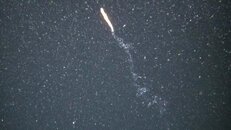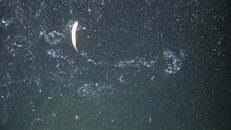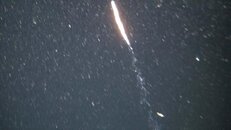Had waited nearly a week for the surge to die down so I could get in a night dive. My last dive (daytime) the surge was strong enough in the shallows to force me into a backwards flip as I tried to film an abalone feeding.
Got down to the park about 8:15 and much to my surprise there were a number of vehicles from CIMI (the Catalina Island Marine Institute) with many divers preparing to do a night dive. So much for having the park to myself. Oh, well. They have as much right to the park as little old me.
Descended as it started to get dark and was disappointed to find the surge had kicked up again and there was a fair bit of sediment in the water. Not what I had hoped for in terms of conditions, but it turned out to be a pretty interesting dive.
Saw (and hopefully filmed) to kelp bass grab a blacksmith, one by the head and the other by the tail. They struggled with it until one won. Then I watched as a kelp bass took a warty sea cucumber in its mouth and pulled it off the rocks. I don't remember ever seeing that before.
Was surprised to have a bat ray bump into me since I was deep within the kelp forest and never see them there at night. Filmed a small octopus in the open plus a number of sheltering garibaldi (so much for nest defense at night). A few other kelp bass got lucky snagging catching blacksmith or kelp surfperch.
Highlight of the dive was probably a substantial number of unidentified polychaete worms spawning. They thought my video lights were the moon and they were going crazy. Filmed a number of gamete trails as they swam vigorously through the water column.
Was pleased when I ascended and saw my total dive time was an excellent 80 minutes given that I'd spent time at 50-54 fsw filming.
Dr. Bill



Spawning worms with streaming gamete trails... like a comet!
Got down to the park about 8:15 and much to my surprise there were a number of vehicles from CIMI (the Catalina Island Marine Institute) with many divers preparing to do a night dive. So much for having the park to myself. Oh, well. They have as much right to the park as little old me.
Descended as it started to get dark and was disappointed to find the surge had kicked up again and there was a fair bit of sediment in the water. Not what I had hoped for in terms of conditions, but it turned out to be a pretty interesting dive.
Saw (and hopefully filmed) to kelp bass grab a blacksmith, one by the head and the other by the tail. They struggled with it until one won. Then I watched as a kelp bass took a warty sea cucumber in its mouth and pulled it off the rocks. I don't remember ever seeing that before.
Was surprised to have a bat ray bump into me since I was deep within the kelp forest and never see them there at night. Filmed a small octopus in the open plus a number of sheltering garibaldi (so much for nest defense at night). A few other kelp bass got lucky snagging catching blacksmith or kelp surfperch.
Highlight of the dive was probably a substantial number of unidentified polychaete worms spawning. They thought my video lights were the moon and they were going crazy. Filmed a number of gamete trails as they swam vigorously through the water column.
Was pleased when I ascended and saw my total dive time was an excellent 80 minutes given that I'd spent time at 50-54 fsw filming.
Dr. Bill



Spawning worms with streaming gamete trails... like a comet!




